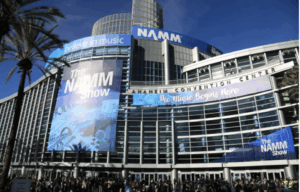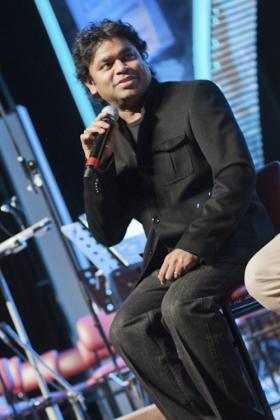
We witnessed history being made as A. R. Rahman’s compositions were conducted and arranged by Matt Dunkley, incorporating German Film Orchestra Babelsberg and KM Music Conservatory Choir, along with various soloists.

© Germany and India 2011-2012: Infinite Opportunities (Photo: Tapan Pandit)
The setting:
We have seen quite a few examples of collaboration between Indian and German musicians – BuJazzO and Eastern Flowers (as a part of the year of Germany in India) being some of the notable projects we have covered before – but nothing compares with the sheer magnitude and grandeur of this historic event. The marriage of Germany’s oldest film orchestra with the music of India’s most prolific music composer, presided upon by one of Britain’s most talented conductors is a shining beacon in the seemingly inexhaustible series of socio-cultural programs that the ongoing year of Germany in India, marking the 60th anniversary of Indo-German diplomatic relations, has offered us, thanks to Germany and India 2011 – 2012: Infinite Opportunities.

© Germany and India 2011-2012: Infinite Opportunities (Photo: Tapan Pandit)
3 years in the making and the brainchild of Dr. Marla Stukenberg, Director of the Goethe-Institut/Max Mueller Bhavan Mumbai, this project was gracefully adopted by the ever-adventurous A. R. Rahman with the cooperation of Klaus – Peter Bayer, the Director of the Film Orchestra Babelsberg, and Matt Dunkley, the world famous British conductor and composer. However, it would not have been possible without the undying support of Andreas Lapp, Chairman of the Board LAPP Holding AG and Honorary Consul of the Republic of India for Baden-Württemberg and Rhineland-Palatinate. Christened ‘Classic Incantations’, Cord Meier-Klodt, the acting German Ambassador, heralded in this event at NCPA on the evening of January 20th, 2012. The lucky few who attended became a part of history, musical and otherwise.
[youtube_video id=gUKt8kpfTyA]
Prologue:
“For the first time everything that I saw, felt and perceived was symbiotically connected with music. A. R. writes not just the soundtrack for films, he composes the soundtrack for an entire country and thus described what is most beautiful and precious in this country – its people” ~ Klaus – Peter Beyer.
“I think for myself and the orchestra this tour will be a journey in more than one way. Everybody tells me that your first visit to India is a life-changing event, so I’m looking forward to experiencing all that India has to offer. It will be fascinating too, to see the reaction of an Indian audience exposed, some for the first time, to the glorious sound of a full symphony orchestra and classical choir performing some of maestro Rahman’s beautiful orchestral film music. I feel very honored to be a part of this historic project.” ~ Matt Dunkley.
“I am really excited and grateful for this gesture of the Babelsberg Orchestra for doing this tour in India along with our students and kids from the KM Music Conservatory. I am sure this will be an experience to Indian score lovers. It will give them a great opportunity to experience and see how many people are involved in creating huge scores and create a thirst among the younger generation to become orchestral musicians…” ~ A. R. Rahman.
[youtube_video id=gwIIkZdFM2Y]
The actual performance:
Matt Dunkley took center stage around 7:15 pm, with the orchestra in the foreground, accompanied by 28 members of the KM Music Conservatory’s choir (14 male and 14 female voices) on a slightly elevated platform, directly in front of a screen that showcased pictures and other animated montages during the performance of each piece.

They began by playing the Warriors of Heaven & Earth Suite, based on the score of the 2003 Chinese film Between Heaven and Earth. This was truly a great start, since not too many people may have been aware of how A. R. Rahman had composed the score for a Chinese film, successfully incorporating Chinese, Turkish and Indian sounds in an entirely acoustic setting. The purposeful arrangements of percussion and warm strings elicited a very oriental aura, and when accompanied by warm lighting effects and Chinese artwork in the backdrop, it had the ability to take the viewers on a mental journey through the mountains, battlefields and trade routes of medieval China.
After completing this musical journey across the Silk Route, the musicians forayed home to the days of the British Raj, playing the Theme from Lagaan and The Rising Suite. The choir shone through in the former, building up the momentum and heightening the tension by chanting out ‘Shaktidaata!’ whereas the wind and brass section of the orchestra made its presence felt in the latter, supported by very non-traditional sounding drums and triangle, emulating a militaristic fanfare at times.

© Germany and India 2011-2012: Infinite Opportunities (Photo: Tapan Pandit)
This was followed by The Passage Suite from Shekhar Kapur’s 2009 short drama film of the same name, led by the soprano Kavita Baliga on vocals; her voice, reverberating at the most opportune moments as she sung along beautifully in French, invoked complex emotions ranging from angst to hope to sheer joy. Upon completion and her departure, the orchestra then played Cry of the Rose, a very different interpretation of A. R. Rahman’s debut composition for the score of the 1992 film, Roja. Led by Navin Iyer on flute, this was a comparatively up-tempo arrangement of the theme of the title track, where strings and the choral background made up for S P Balasubramaniam’s baritone on vocals on the original.

A surprise treat:
Now that the audience was more or less well aware of what to expect, A. R. Rahman himself threw us a curveball. He graced the stage, amidst an uproarious applause, and explained that it was one thing to simply hear the music, but it is a whole different thing when it comes to composing a score for a movie. He made us watch a short clip of an action sequence from the 2010 movie Robot (or Endhiran in Tamil), especially the part where the robot army comes together as one giant unit that goes on a rampage.

Initially, we watched this clip in complete silence, and then we watched it again, this time with the choir and orchestra playing the Robot Suite along with the video. Only now could the audience see, for the first time, the sheer amount of ingenuity within the composition; one could see how the brass section of the orchestra comes alive during a state of rising tension, with the choir sounding ever so eerie. Similarly, the anticlimactic moments of the action sequence were also sensed by the slow decline in the speed and intensity of the brass and choral sections.
Following that, they played the 127 Hours Suite and the Lord of the Rings Suite. The latter was particularly spectacular, since it featured Kavita Baliga and Arun H.K. on vocals, who complemented each other beautifully as they sang out words from J. R. R. Tolkien’s poems and novels, while the orchestra and choir played the A. R. Rahman’s compositions from the musical. At other times, the apocalyptic brass, the thunderous percussion and the swift wind and strings sections emulated the all-too-familiar battlefield scenes, which, though darker at first, transitioned into a more triumphant sounding fanfare towards the end. After the Robot Suite, this was probably the best piece before the interval.

After the Interval:
Upon regrouping, the orchestra started off with the Theme from Bombay, one of A. R. Rahman’s most prolific compositions ever (originally composed in 1994-95, it was used ten years later in the Nicolas Cage starrer Lord Of War). Navin Iyer’s delicate flute melody and the intricate interchanging of the strings sections – where one could hear the difference between the different kinds of violins, violas and cellos – all came together, supported by the regular chimes of bell. A truly heart-warming theme, it comes as no surprise that it was also used in another emotionally driven 2002 Palestinian film Divine Intervention, which also straddles the themes of love and ethnic strife.

After this, they played a fairly long and diverse composition – Tribute to Indian Composers – in which they showcased many different iconic pieces, starting with tributes to the music composers from very infancy of Indian cinema. Veterans covered include MS Viswanathan, Ilayaraja, Madan Mohan, S. D. Burman, Laxmikant Pyarelal, Shankar – Jaikishan, Kalyanji Anandji, Naushad, whereas more contemporary composers attributed to include Jatin-Lalit (a flute driven cover of Pehla Nasha), Shankar-Ehsaan-Loy (a clarinet and cello driven version of Kal Ho Na Ho), and even A. R. Rahman himself (a very dramatic sounding strings and wind driven rendition of Kehna Hi Kya).

© Germany and India 2011-2012: Infinite Opportunities (Photo: Tapan Pandit)
One couldn’t blame the audience for clapping loudly numerous times in the middle of this piece, as the orchestra delivered numerous favourites to them, one by one, with the smoothest of transitions in this medley. Not too surprisingly, within mere hours of the concert ending that night, we found a fan-made recording of the same on YouTube, given below:
[youtube_video id=_rgAP9uC6xE]
They then played the Elizabeth: The Golden Age Suite and the Subhash Chandra Bose Suite, both of which were very different in nature. While the former was ostensibly more medieval European in its arrangement, with emphasis on wavering strings and choir, the latter was definitely more close to home in its feel and sound, despite featuring Western instruments, featuring little bits of the songs Zikr and Azaadi, probably the most popular part of the soundtrack for the 2005 film Netaji Subhash Chandra Bose: The Forgotten Hero. Following this was another beautiful composition, a tribute to Indian actresses.
The Grand Finale:
This might have been the moment we were all waiting for. A. R. Rahman himself took to the stage again, to play the piano. He also brought in Asad Ali Khan on sitar. Then, with the rest of the orchestra and choir, they played the Suite from the ever-so-popular Slumdog Millionaire. We were fortunate enough to capture a few moments of this on stage brilliance from the media preview night, the previous day.
[youtube_video id=cuhG4zALKUY]

© Germany and India 2011-2012: Infinite Opportunities (Photo: Tapan Pandit)
The Suite was a composite of many pieces from the OST, such as Dreams on Fire, Latika’s Theme and the stupendous sitar solo from Mausam and Escape. Here is a live video of the same, captured by another member in the audience:
[youtube_video id=czl_hK8zMt8]
As expected, this was followed by numerous rounds of applause and standing ovations, where the conductor, the soloists, the instrumentalists, members of the choir, the Director of the Orchestra, A. R. Rahman himself and the organizers were felicitated on stage.
The Afterthought:
As we were departing, we couldn’t help but wonder why our palms were aching now. Throughout the performance, we were more or less entranced to even feel anything other than sheer ecstasy at having witnessed something of this stature. We left, with a lot of questions and comments buzzing through our minds, emotions running amok. We did harbor some feelings of resentment – Why could this not have been longer? If only they had included a few other suites from some of A. R. Rahman’s other prolific compositions – Taal, Rangeela, Zubeidaa or even Dil Se… if only…

Photo Credits: Parizad D., Tapan Pandit and Shresht Poddar
Special Thanks: Ketaki Golatkar and Catharina Haller @ Germany and India 2011 – 2012: Infinite Opportunities:; Aamir, Sneha and Surya @ Avian-Media; Ashwitha Jayakumar.
To check out other similar events, click on either of the following: BuJazzO, Stuttgart Chamber Orchestra and Eastern Flowers.








